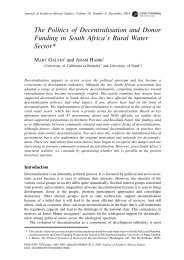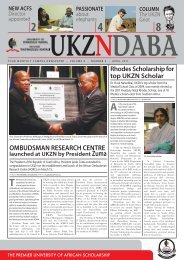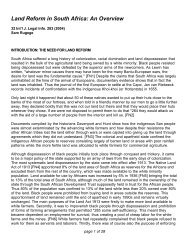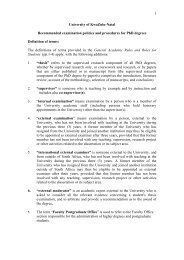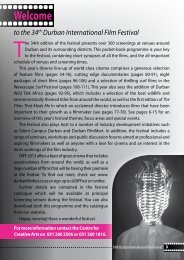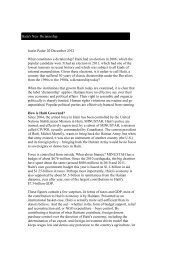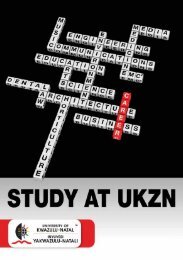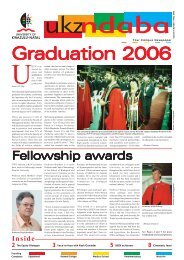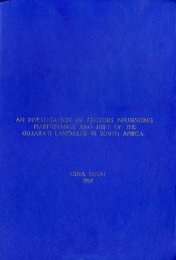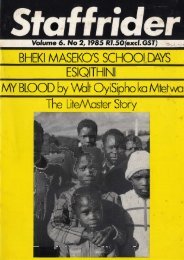Staffrider Vol.3 No.4 Dec-Jan 1980 - DISA
Staffrider Vol.3 No.4 Dec-Jan 1980 - DISA
Staffrider Vol.3 No.4 Dec-Jan 1980 - DISA
Create successful ePaper yourself
Turn your PDF publications into a flip-book with our unique Google optimized e-Paper software.
Staff rider WorkshopPOLITICS AND LITERATURE IN AFRICA: A REVIEWAfrican writing has become synonymous with politics inthe minds of many. There's nothing wrong with that. Africa'smost pressing problems are political and any writing thatprofesses to come to grips with Africa today cannot be otherthan political. We can look at such writing from two angles:First, the literature of the countries under white domination;secondly, the literature of independent Africa.POLITICS OF RESISTANCE:This kind of literature thrives in plural societies whereAfricans live or have lived under a white-settler minorityregime. It was common in East Africa; it persists in SouthernAfrica.Ngugi wa Thiong'o is probably the leading exponent ofsuch writing in East Africa. His first published novel, WeepNot Child, is based on the Mau Mau emergency. Since he'slooking back after independence he's able to go beyondcataloguing mere grievances and events, and concentrates oncharacter and relationships. He re-enacts the tension of thewhole war situation within a single family and shows howevents from without contribute towards creating strainedrelations. A Grain of Wheat, considered by many to beNgugi's best novel, is set in the early days of Kenya's independencebut actually takes us back to the era of the MauMau. It is structurally more complex and linguistically moresophisticated than any of Ngugi's other novels. The novelgradually unfolds towards an understanding of Ngotho'smysterious character and an exposure of Waiyaki's betrayer,one of the leaders of the Mau Mau. Ngugi manages to showthe effects the long years of struggle have produced oncontemporary Kenyans: shame, guilt, fear, suspicion and soon.Godwin Wachira's Ordeal in the Forest is also based onthe Mau Mau revolution. Wachira depicts the ordeal of fiveboys, who are hounded out of their homes and forced to fleeschool in order to join the freedom fighters in the forest.This kind of writing is now of historical interest to EastAfricans and it is highly probable that less and less will beheard about the Mau Mau era. But the issue of white dominationis still a burning one in southern Africa, hence most ofthe literature in this region focuses on the problem.The opening of Alex La Guma's In the Fog of a Season'sEnd shows the polarization of political attitudes betweenblack and white in South Africa. The black and white viewsappear irreconcilable. The white Major of the Special Branchaddresses his prisoner in the following paternalistic terms:/ do not understand the ingratitude of your people . . .Look at what we, our Government, have done for yourpeople. We have given you nice jobs, houses, education. Education,ja. Take education for instance. We have allowed youpeople to get education, your own special schools, but youare not satisfied. No, you want more than what you get. Ihave heard that some of your young people even want tolearn mathematics.The prisoner replies in the following uncompromisingterms:You want me to co-operate. You have shot my peoplewhen they have protested against unjust treatment; you havetorn people from their homes, imprisoned them, not forstealing or murder, but for not having your permission tolive. Our children live in rags and die of hunger. And youwant me to co-operate with'you? It is not possible.Predictably, the black man in the novel is imprisoned andlocked up and that marks the end to the dialogue. La Gumagives this instance as the background to black guerilla resistancein South Africa, which is the subject of his novel. HisSTAFFRIDER, DECEMBER <strong>1980</strong>/JANUARY lV»iThis article by the authorof Mzala (<strong>Staffrider</strong> SeriesNo 5) is part of a longerpaper in which he alsodiscusses the question ofliterature and culture.Mbulelo Mzamane iscurrently preparing athesis on South Africanwriting at SheffieldUniversity in England.He is also writinghis first novel.Mbulelo Mzamanemmother works And A Threefold Cord, A Walk in the Night andThe Stone Country are also concerned with the conditionsunder which the blacks of South Africa live.In A Night of their Own Peter Abrahams, though withconsiderably less skill than La Guma, also deals with politicalresistance to white oppression. He's as much concerned withthe fate of blacks as with that of whites. His novel, however,suffers as creative writing because of his over-reliance uponreal events. The South African situation has provided himwith ready-made plots like the so-called Durban riots, theSharpeville massacre, the Rivonia trial and so on. The novelturns documentary. His characterization here, as in his othernovels, suffers because he compels his characters to stand forhis ideas. His technique as a novelist in general is deficient,but his value as a pioneer and an inspiration in the field ofAfrican literature has been acknowledged by such prominentwriters as Ngugi and Mphahlele.Dennis Brutus, one of the most prolific poets SouthAfrica has produced, evokes the hardships under which theblacks in South Africa live. The predominant image in hispoetry is that of the forces of oppression; police batons,sirens, prisons and so forth. Though Brutus can be verydepressing he never completely despairs. In a poem like'Somehow We Survive' the sense of life amidst oppressionand the will to live are very strong. Letters to Martha arepoems which primarily deal with his experiences as a politicalprisoner on Robben Island. They're characterized, in DanielAbasiekon's words, by 'vigour, integrity and defiant hopefulness.'His other poetry publications are Sirens, Knuckles,Boots, A Simple Lust and Poems from Algiers.Keorapetse Kgositsile says he hopes by his revolutionarypoetry to bring together blacks everywhere. His poetry, as inMy Name is Afrika, shows signs of Afro-American influences.His other poetry publications include Spirits Unchanged andFor Melba: Poems.Richard Rive is known more for his novel, Emergency(about the political upheavals of the sixties) and as a shortstory writer than as a poet. 'Where the Rainbow Ends' is anexpression of his firm commitment to non-racialism. Hedemands an equal place under the non-racial sun:Where the rainbow endsThere s going to be a place, brother,Where the world can sing all sorts of songs,and we 're going to sing together, brother,You and I, though you 're white and I'm notIt's going to be a sad song, brother,Because we don't know the tuneAnd it's a difficult tune to learn,But we can learn brother, you and I,There's no such tune as a black tune.There's no such tune as a white tune.




